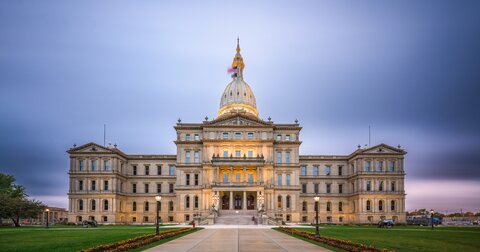UAW enters immigration debate, demands driver’s licenses for illegal immigrants
Union’s demand list includes items that don’t serve its core members, ex-member says
When the United Auto Workers submitted its priority list to the Michigan Legislature for the lame-duck session, it included voting for a bill to give illegal immigrants living in Michigan driver’s licenses.
The UAW urged the outgoing Democratic trifecta to “Fight back against divide-and-conquer politics” by voting for the “Drive Safe” bill package, according to a Dec. 4 letter obtained by Michigan Capitol Confidential.
The letter asked lawmakers to vote for House Bills 4410, 4411, and 4412.
“With over 300,000 active and retired members, the UAW is Michigan’s largest union. We fight for the working class, and we strongly encourage our legislators to do the same by taking urgent action to pass legislation that helps working families and our communities,” said the letter signed by UAW President Shawn Fain.
The union’s support of political questions that don’t benefit its members is one reason members either leave the union or choose to pay agency fees that fund representational activity but not political spending, according to Terry Bowman, who has worked for Ford at the Rawsonville Plant in Ypsilanti, Michigan, for 28 years. Bowman was a UAW member for 13 years but left after his union dues promoted “political and social agendas I strongly disagreed with and knew were harmful to America's auto industry,” he told CapCon in an email.
Bowman advocated for Michigan to become a right-to-work state, which it did in 2013, so his dues wouldn’t fund the union’s political action. Union dues can fund political speech, such as advocating for driver’s licenses for all, but individual dues-payers have the choice not to pay the portion of dues that go toward political activities.
After the 2024 repeal of right-to-work, UAW workers have no way to show disapproval of a union that spends time and money lobbying for issues the bulk of its membership is likely opposed to, Bowman said.
“Unfortunately, UAW officials are continuing their long, sad history of promoting political and social issues that either have nothing to do with the auto industry or in fact can harm the environment that creates automotive jobs in the private sector,” Bowman told CapCon.
The UAW reported spending $4.1 million on political activities and lobbying in 2023, according to the most recent LM-2 report filed with the U.S. Department of Labor.
“This makes it very clear that unlike what the UAW claims, the union does not represent the will of the workers.” Bowman wrote. “Official union political and social positions do not flow up from the actual will of the workers, but instead are forced on us by the personal political and social ideology of just a few UAW executives in positions of power. “
“This is why all workers (as stated above) in the private sector deserve the same rights, freedoms, and protections that public sector workers enjoy. We need protection from the very same unions that incorrectly claim to have our best interest at heart.”
The UAW didn’t respond to a request for comment.
The UAW isn’t alone. The AFT-Michigan teachers union urged action to stop the deportation of illegal immigrants, according to a report from Michigan News Source.
Michigan Capitol Confidential is the news source produced by the Mackinac Center for Public Policy. Michigan Capitol Confidential reports with a free-market news perspective.


 Dues-skim union has no bargaining power for home care providers
Dues-skim union has no bargaining power for home care providers
 Workers at Mt. Clemens tooling company are on the way to decertifying the UAW
Workers at Mt. Clemens tooling company are on the way to decertifying the UAW

 Michigan’s auto industry boondoggle: billions in subsidies, 287,000 jobs lost
Michigan’s auto industry boondoggle: billions in subsidies, 287,000 jobs lost
 Why you can’t buy cars on Sunday in (some parts of) Michigan
Why you can’t buy cars on Sunday in (some parts of) Michigan
 Fees for duck, deer hunting could increase after lame-duck legislation
Fees for duck, deer hunting could increase after lame-duck legislation